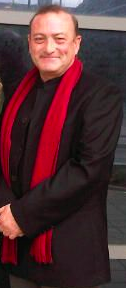Gregory B. Lee
Gregory B. Lee | |
|---|---|
利大英 (Lì Dàyīng) | |
 Lee in 2013 | |
| Born | 1955 (age 68–69) |
| Occupation(s) | Academic, author, broadcaster |
| Known for | Sinologist |
| Children | 2 |
| Awards | French Order of Academic Palms; Fellow of the Hong Kong Academy of the Humanities |
| Academic background | |
| Education | Liverpool Collegiate School |
| Alma mater | |
| Academic work | |
| Discipline | Chinese cultural studies |
| Institutions | University of Cambridge SOAS, University of London University of Chicago University of Hong Kong City University of Hong Kong University of Lyon |
| Main interests | Chinese and comparative literary and cultural studies |
Gregory B. Lee (born 1955) is an academic, author, and broadcaster. Lee is Founding Professor of Chinese Studies at the University of St Andrews.[1] He was until July 2020, Director of the French research Institute for Transtextual and Transcultural Studies based at Jean Moulin University Lyon 3.[2] Lee was previously Chair Professor of Chinese and Transcultural Studies and Dean of the College of Liberal Arts and Social Sciences at the City University of Hong Kong. From 2007 to 2010 Lee was First Vice-President (Research) of Jean Moulin University Lyon 3.[3] In 2010, Lee was made a Chevalier (Knight) in the French Order of Academic Palms. In 2011, he was elected Fellow of the Hong Kong Academy of the Humanities.[4]
Academic career[edit]
Lee received his undergraduate degree in modern and classical Chinese at the University of London's School of Oriental and African Studies (SOAS) in 1979, and his PhD in Chinese poetry from the same institution in 1985.[5] He also studied political economy and Chinese literature at Peking University (1979–83) as a British Council Scholar, and held a British Academy Postdoctoral Fellowship (1985–86) at the Chinese Academy of Social Sciences's Institute of Literature, whose then director was Liu Zaifu.
Lee formerly taught in the United Kingdom at the University of Cambridge (1983–1984) and the School of Oriental and African Studies (1987–1988), before occupying posts as an assistant professor in East Asian Languages and Civilization at the University of Chicago (1990–1994) and associate professor at the University of Hong Kong (1994–1998), where he taught comparative literature. A specialist in Chinese and comparative literary and cultural studies, his more recent work is in the realm of comparative cultural history, specifically in the fields of Chinese diaspora, transcultural studies, and intellectual decolonization. He joined the University of Lyon in 1998.[3][6]
Writings[edit]
Lee's dual-language biographical novel 第八位中國商人同消失咗嘅海員/The Eighth Chinese Merchant and the Disappeared Seamen was published in 2022 by Hong Kong's 手民出版社 Typesetter Press [1].
Lee's first book Dai Wangshu : The Life and Poetry of a Chinese Modernist, The Chinese University of Hong Kong Press (1985), analysed the work and career of the modern Chinese poet Dai Wangshu. His second book, Troubadours, Trumpeters, Troubled Makers: Lyricism, Nationalism and Hybridity in China and Its Others (C. Hurst & Co. and Duke University Press, 1996), discusses the controversy surrounding the "Chineseness" of modern Chinese writers following the 1989 Tiananmen Square protests.[6] His third book was Chinas Unlimited: Making the Imaginaries of China and Chineseness (Routledge and Hawai'i UP, 2003).[7] His China's Lost Decade: The Politics and Poetics of the 1980s (Tigre de Papier, 2009; 2011) was republished as a revised edition in 2012 by Zephyr Press. His Un Spectre hante la Chine : Les fondements de la contestation actuelle was published in April 2012 (Tigre de Papier Archived 1 November 2020 at the Wayback Machine, 2009; 2011). Lee's China Imagined: From European Fantasy to Spectacular Power was published in 2018 by C. Hurst & Co.[8]
Other professional activities[edit]
Lee has also been a radio broadcaster on China and the Chinese diaspora. In 2005 he wrote and presented BBC Radio 3's Sunday Feature "Liver Birds and Laundrymen"[9] in which he revisited the story of Europe's oldest Chinatown, in Liverpool (UK), and interrogated dominant British perceptions of the Chinese. He has also translated a variety of Chinese works, including those of contemporary poet Duo Duo (Looking Out From Death Bloomsbury, 1989; The Boy Who Catches Wasps Zephyr, 2002),[10] Dai Wangshu, and Nobel laureate Gao Xingjian ("Fugitives", a controversial 1989 play). Duo Duo was awarded the 2010 World Literature Today's Neustadt International Prize for Literature.
Lee is the General Editor of the journal Transtext(s)s-Transcultures.[11]
References[edit]
- ^ "Research portal". Retrieved 12 August 2020.
- ^ "scanRBETA". scanRBETA. Retrieved 11 May 2019.
- ^ a b "Gregory Lee". 18 December 2017. Retrieved 13 November 2018.
- ^ "Hong Kong Academy of the Humanities". Retrieved 11 May 2019.
- ^ "SOAS Executive Board Agenda" (PDF). 29 November 2010. Retrieved 13 November 2018.
- ^ a b Wai, Isabella (1998–1999). "Scholar debunks myth of monolithic China : An interview with Gregory Lee". Road to East Asia. 3. Retrieved 13 November 2018.
- ^ "One Englishman's story of Chinese identity". Taipei Times. 7 August 2014.
- ^ "Financial Times". 17 December 2018. Retrieved 11 May 2019.
- ^ "Liver Birds and Laundrymen. Europe's Earliest Chinatown". BBC. 13 March 2005.
- ^ Bien, Gloria (2012). Baudelaire in China: A Study in Literary Reception. University of Delaware. pp. 214–215, 220. ISBN 9781611493900.
- ^ "Open Edition Journals". Transtext(e)s Transcultures. Open Edition Journals. Retrieved 11 May 2019.
External links[edit]
- British sinologists
- Chinese–English translators
- Alumni of SOAS University of London
- Academics of the University of Cambridge
- Academics of the University of London
- University of Chicago faculty
- Chevaliers of the Ordre des Palmes Académiques
- 1955 births
- Living people
- Academic staff of the University of Lyon
- British literary critics
- British biographers
- British radio personalities
- British expatriates in China
- British expatriates in France
- British expatriates in Hong Kong
- British expatriates in the United States
